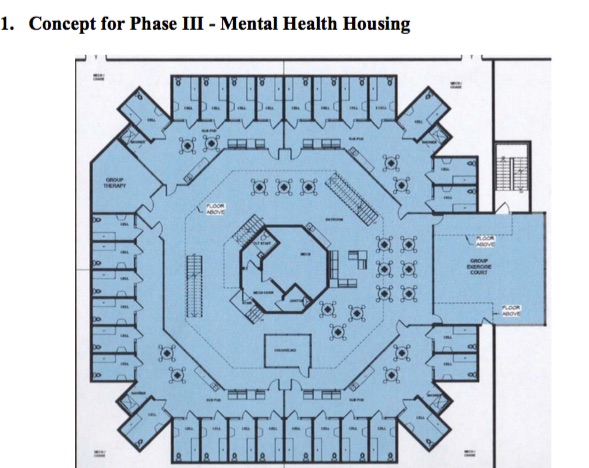In a court filing submitted Wednesday, the Orleans Parish Sheriff’s Office unveiled plans to build a controversial jail facility for inmates who need acute mental-health and medical treatment.
Sheriff Marlin Gusman has long advocated constructing such a building. But while he called for 380 to 764 inmate beds in 2014, the plan submitted today by a federally-appointed compliance director is much more limited in scope, at 89 beds.

The building would be two stories tall, with an infirmary and clinic on the second floor.
The plan also calls for renovating the now-closed Temporary Detention Center to offer 200 more beds for general-population inmates. The jail now has 1,438 beds.
“In all of the years since I began the effort of consolidating a sprawling prison system into a much smaller, self-sufficient Orleans Justice Complex,” Gusman said in a written statement, “I have advocated for the construction of a facility to address the mental health needs of our jail population.”
The plan was developed and submitted by Compliance Director Gary Maynard, who was appointed by U.S. District Judge Lance Africk last fall to run the jail. Maynard declined to comment on the plan.
City Councilwoman Susan Guidry, who chairs the council’s Criminal Justice Committee, has opposed an expansion of the jail. In an interview, Guidry said she doesn’t support Maynard’s more modest proposal.
“I’m disappointed that we will build another bed facility,” Guidry said. “The jail that we have built today has twice the number of beds of the national average. As the report notes, we have been working very diligently and very successfully on reducing our jail population.”
But the Landrieu administration said Wednesday night that the plan to build Phase III is “reasonable and necessary, as it is limited to a small number of beds specifically for medical and mental health needs.
Maynard also recommends moving all juvenile offenders from the jail to the city’s juvenile facility, the Youth Study Center, which is set to be expanded. In the meantime, Maynard suggests moving them to juvenile jails in nearby parishes.
A second plan, also submitted by Maynard on Wednesday, deals with operational changes at the jail. Maynard proposes reducing inmate-on-inmate violence by analyzing past assaults and making better decisions on where to house violent inmates.
A key problem at the jail is understaffing. To increase hiring, Maynard wants to draw from the Police Department’s applicant pool, a proposal that the city’s Civil Service Department has already agreed to.
To rein in costs, Maynard proposes a full financial audit of the Sheriff’s Office and a review of Gusman’s expensive legal contracts.
Under the plan, Maynard says the jail will be in full compliance with the U.S. Constitution, under a federal reform plan known as a consent decree, by Oct. 1.
Africk, who is overseeing the reforms, must approve the proposals.
Debate about building a separate facility for mentally ill inmates has been ongoing for several years, since it was revealed in 2013 that the $145 million Orleans Justice Complex was not designed to accommodate them. It opened in late 2015.
In 2014, Africk approved Gusman’s plan to house inmates requiring mental-health treatment at the state’s Elayn Hunt Correctional Center in St. Gabriel.
For a permanent solution, Gusman has pushed for a new building, known as the “Phase III” facility, on vacant land between the new jail and a kitchen-warehouse facility.
As The Lens reported in 2012, former Deputy Mayor Andy Kopplin previously discussed a 600-bed Phase III construction plan with Gusman.
But until Wednesday, the city had publicly opposed the new building after Gusman proposed it in court in 2014. Instead, city officials had said Gusman should renovate a portion of the new jail to house inmates who require special treatment.
The plan released Wednesday, however, “is a far cry from the sheriff’s proposal for hundreds of unnecessary jail beds,” wrote Tyronne Walker, communications director for Mayor Mitch Landrieu. “Our goal all along has been to build the right size jail, only as large as necessary, as to not waste precious taxpayer funds that could be spent on other needs.”
An order signed by Africk last year gave the city “final authority and approval” over capital expenditures proposed in a new construction plan.
Criminal justice reform advocates, led by the Orleans Parish Prison Reform Coalition, have pushed back against an expansion of the jail beyond the 1,438-bed cap set by the City Council in 2011. Coalition organizers did not immediately respond to a request for comment, promising to release a statement.
In his proposal, Maynard noted corrections experts’ recommendations that the Orleans Justice Center hold no more than 1,294 inmates, or 90 percent of its capacity, so violent inmates can be separated from nonviolent ones.
Last year, the average daily number of inmates under Orleans Parish’s control was well over that number. That includes inmates held elsewhere.
Since late 2015, Gusman has housed general-population inmates in far-flung parishes in northern Louisiana because he doesn’t have the staff to supervise them properly.
Guidry said she is open to renovating and reopening the Temporary Detention Center, which would enable some of those inmates to return to New Orleans.
“I think that’s a very good use,” for the Temporary Detention Center, she said. “Get our inmates home where they can be with their families and their attorneys.”
This story was updated after publication to include additional details about the plan, comments from Councilwoman Susan Guidry and a statement from the Landrieu administration. (Jan. 4, 2017)
